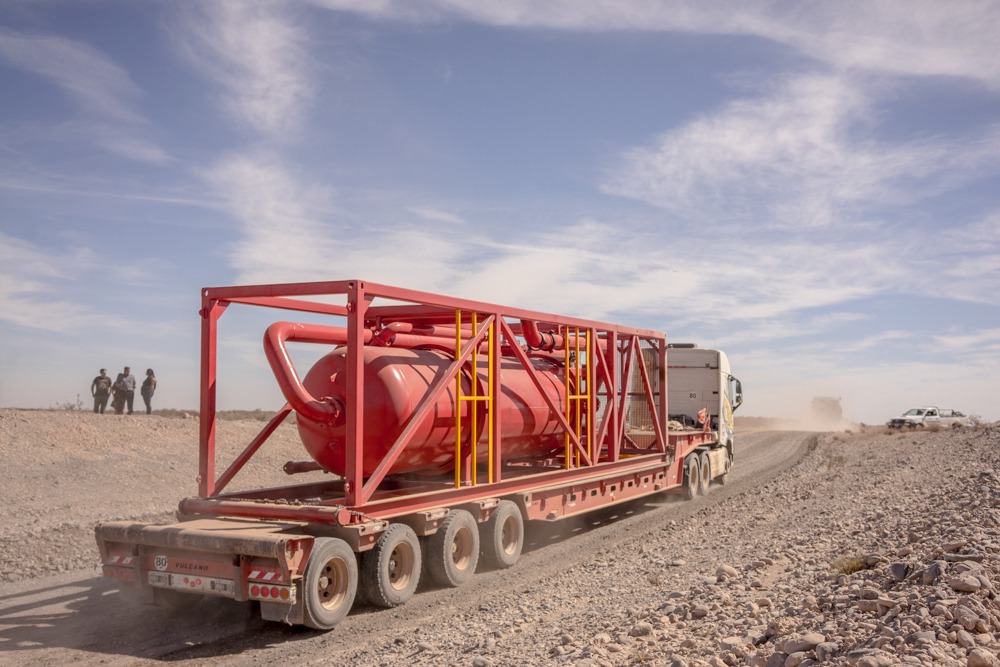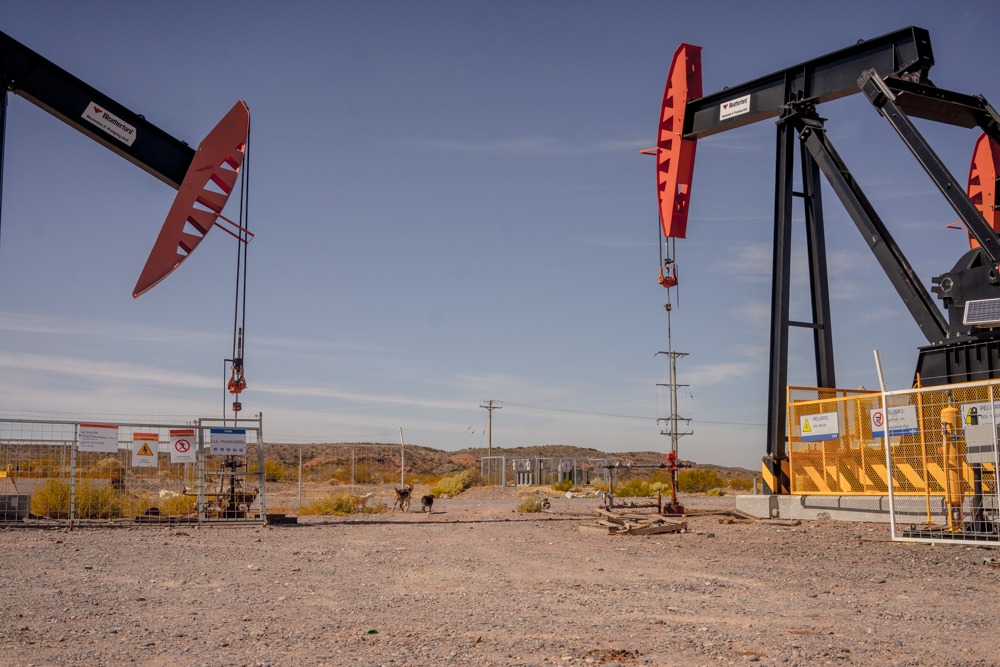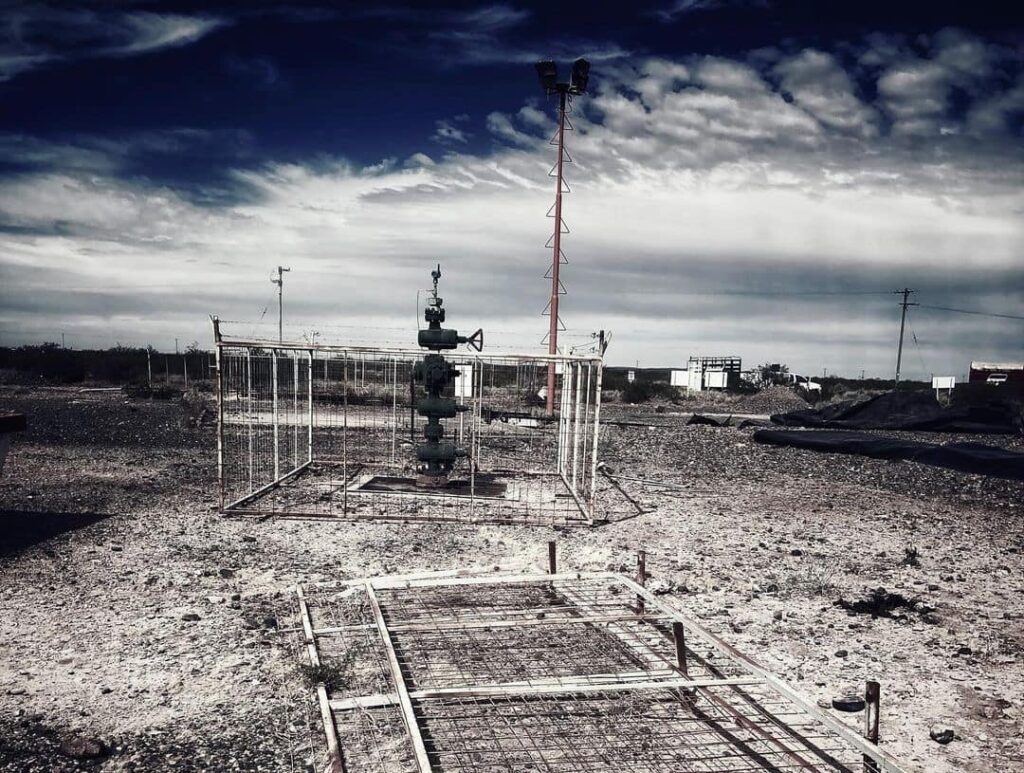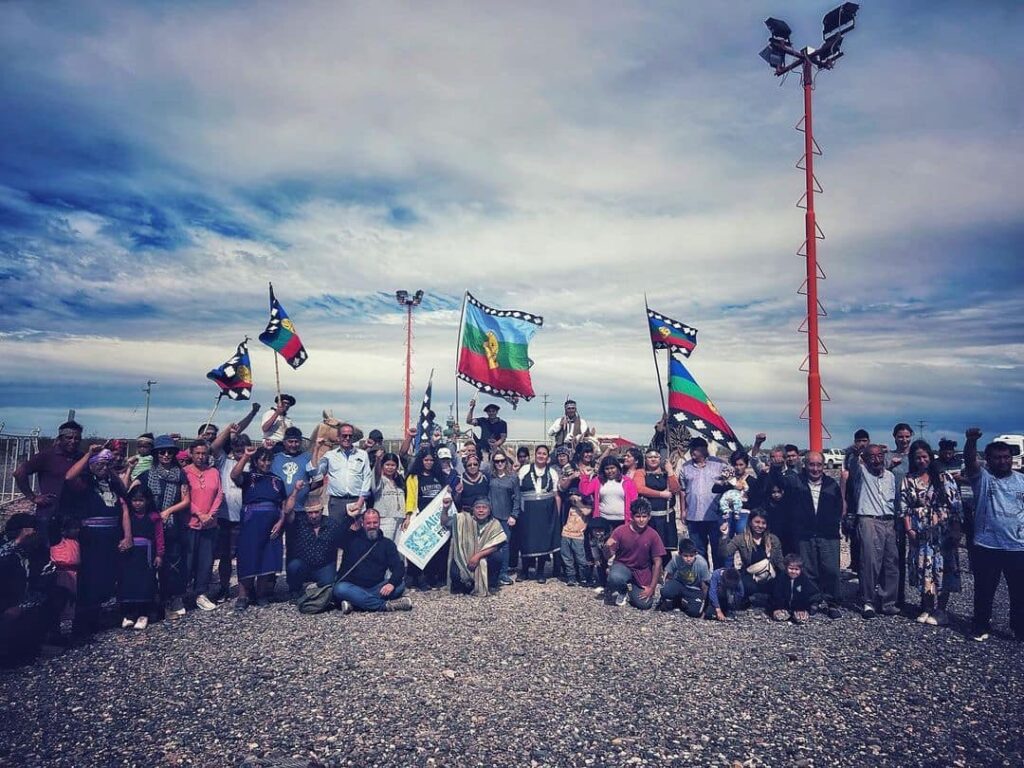(English) They promised to get Argentina out of poverty with fracking; now they’re poorer
Fuente: Avispa Midia
By Santiago Navarro
Translated by Elizabeth L. T. Moore
Patagonia, southern Argentina, ancestral territory claimed by the Mapuche village and fought-over by transnational companies that combust hydrocarbons. Even though the land is quite far from the military conflict between Russia and Ukraine, energy price volatility has put them on the geopolitical map for being the second world reserve of unconventional gas and fourth in crude oil of the same origin.
Here, almost 28 thousand m³ of oil and 44 thousand m³ of gas is extracted daily, even though almost nobody talks about the impacts it leaves on the communities that live in this area.
It was in 2019, in a civil court in Santiago de Chile, when the Mapuche village presented cases of environmental damage and violations of human rights in Argentina by the exploitation of oil and unconventional gas, extracted by the method known as hydraulic fracturing (fracking), a technique that, according to the Instituto Argentino del Petróleo y el Gas (IAPG), has been used in the country since 1959.
Fracking consists of injecting additive fluids at a very high pressure to generate cracks in the bedrock, thus allowing the hydrocarbon to flow to the well. The mixture is “basically formed by water (more than 90%) and some sand,” announces the IAPG platform.

The country’s Ministerio de Economía has documented, this year in 2023, in its report Argentina Productiva 2030 Plan para el Desarrollo Productivo, Industrial y Tecnológico, that “in an unconventional well, 60 million liters of water and 10 thousand tons of sand are injected.”
Three years after the Mapuche village’s complaint, between March 29 and April 5 of this year, various environmentalists from the Tribunal Internacional de los Derechos de la Naturaleza conducted an inspection in the Neuquén and Río Negro region, where Cuenca Neuquina is found, that makes up the main hydrocarbon producer of the country, better known as Vaca Muerta. The delegation managed to verify and document several environmental impacts and human rights violations that fracking has caused.
One of the main problems the delegation has focused on has been water use. Environmentalists warn that the region is already experiencing a water crisis, when barely five of the 31 companies that have concessions in the the region are in the exploitation phase. Meanwhile, this year the demand for water could possibly double. Furthermore, this is added to the storage of the toxic waste left by the extraction of these energies.
Environmentalists have registered the presence of oil landfills, trash containers and mountains of waste accumulation, products of drilling the wells, which do not have any security measures. This has led observers to conclude that the authorities are complicit.
“Without a shadow of a doubt, there are institutions in charge of controlling all these activities. But they’re on the edge, or they’re total accomplices of what’s happening. It would be enough to look at the open-air landfills of accumulated petroleum,” said Alberto Acosta, former presidential candidate of Ecuador, who has also been part of the environmental delegation in Neuquén.
Since 2020, the Asociación Argentina de Abogados/as Ambientalistas has promoted before the law an order to enter the plants where they are depositing the petroleum waste from Vaca Muerta. It criminally accused the company Comarsa for accumulating and concentrating toxic waste in its installations. It denounced petroleum companies like YPF, Shell, Chevron, among others, for producing these residues in the drilling marks.
Among the irregularities the lawyers registered, they found what they classified as “petroleum trash.” Trash that, they declared in a statement, “contains radioactive remains and heavy metals. Also found was ground contaminated by petroleum, liquids with oil and liquids with petroleum, whose origins are not found registered.”



The spokesperson of the Argentinian lawyers, who has also joined the delegation that has reviewed the south of the country, affirmed/stated/claimed that only the company Comarsa, between 2016 and 2019, assembled/gathered around 720 thousand metric tons of toxic trash in open-air.
Acosta, the Ecuadorian, has warned that what’s currently happening on these lands is a huge social environmental disaster. “This region is literally drying up. A region where rural inhabitants, above all, the indigenous Mapuche villages, are being robbed of the rivers. The rivers are disappearing and that water goes to extractivist activities,” the Ecuadorian affirmed and added that “only a well can use up to 90 million m³.”
The observer team concluded that “what’s more, the Mapuches were not consulted, even though the country ratified Convenio 169 of the OIT which establishes the requirement of free and informed enquiry and the need for consent from indigenous villages. Not only that, they’ve been victims of other forms of violence. They even try to deny their ancestral presence in said territories,” it recorded.
Furthermore, it’s not just the use of millions of cubic meters of water, but also the quantity of toxic chemical products that are filtered from the well and affect the flow of underground water. “Añelo (department) is one of the clearest examples. It’s the petroleum capital of the region, and water can’t be consumed there,” says the first recommendation conducted by the members of the Argentinian government delegation.
The observers have also documented a large quantity of seismic movement in the area, highlighting furthermore that cancer indications are on the rise, just like diseases caused by heavy metals in the blood.
More petroleum to get out of poverty
When the exploitation of Vaca Muerta was beginning, they promised there would be energy autonomy, external debt and poverty in the country would be over. One decade later, in Argentina “40% of the population lives in poverty, at least 4 million people live in destitution, which represents 8% of the population,” detailed Natalia Greene, secretary of the Tribunal Internacional de los Derechos de la Naturaleza.
The same discourse gained strength again in 2023. The country’s Ministerio de Economía clearly affirms in its document called Plan para el Desarrollo Productivo, Industrial y Tecnológico 2030 that “the context of the war between Russia and Ukraine has opened a new opportunity for Argentina to earn participation in the global energy markets. The maturation of the Vaca Muerta oil field coincides with this setting,” through which it will be possible to generate quality jobs and lower poverty.
It even justifies the exploitation of the Cuenca del Neuquén, considering that this gas is considered clean and necessary for the so-called energy transition. “We’re sure it’s possible to double exportations: the energy transition brings us a favorable backdrop so we can develop the potential Vaca Muerta exporter, of low-emission hydrogen and minerals like lithium or copper,” points out the development plan.
The environmentalist Greene strongly affirms that these discussions that justify extractivism to deal with poverty, “that run across Latin America from top down, from north to south, from east to west, are always false.”
Court
This court made up of prominent figures in the care of the environment was born in Quito, Ecuador, in 2014 as a space of civil society that judges the cases of violation of rights of nature and environmentalists. In this way, it considers Nature as a legal subject with rights equal to humans.

Those who join the court have traveled various countries documenting and denouncing the affectations to nature, mainly, the conflicts caused by the exploitation of hydrocarbons and megaprojects.
In this instance, they’ve traversed not only the area exploited by fracking in the Argentine Patagonia, but also they’ve joined government representatives, oil companies, social organizations and communities affected by the activity.
The environmental delegation will present a report that will be analyzed by a panel of more than 60 judges that make up part of the court, elected by their career path, like the Hindu doctor, physicist, philosopher and writer Vandana Shiva, to present the relevant recommendations.
Although it’s not binding, it is a precedent to be consider by the rulers in office. “We hope this sentence serves, in one sense, to provoke society’s conscience, to mobilize in something the conscience of the rulers, which is often difficult, if not impossible. Above all, we hope that it will serve as an element for the communities’ struggles”, said the Ecuadorian economist Acosta.


